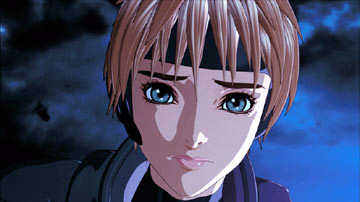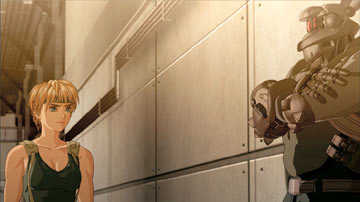

STOP DUBBING MOVIES. There is a debate raging in the world of anime on which is better - dubbed versions, or the original Japanese dialogue tracks. For anybody who considers themselves a fan of movies, anime, or whatever, this is a monumentally stupid question. Dubbing is moronic, even more so the way that American companies insist on doing it. The quality of the script for Appleseed, based on the manga by the legendary Masamune Shirow (the creator of Ghost in the Shell) makes the film seem even dumber. While there is plenty of manga available for sale in various outlets, the quality of manga landing on the big screen leaves much to be desired. Recent examples include Ghost in the Shell 2 and The Cowboy Bebop Movie.
Appleseed was already serialized once before. Compacting the entire story (originally four volumes) into one films means that there is a lot of information to cram into the script, and this is the primary problem. Adapters Haruka Handa and Tsutomu Kamishiro opt to try to include as much as possible, which means there are long segments of dull exposition. Even with this, they fail to expound on many of the salient facts of the story, leaving gaping plot holes and unknown character motivations. The film takes place in the future, where war rages over most of the planet. In the city of Olympus, there is peace, especially between humans and bioroids (essentially cyborgs). The Seven Elders, a group of, uh, seven elders, leads Olympus with the help of Gaea, a supercomputer. Elements of the military are still wary of the bioroids, and are trying to gain control of the government. Into this mix falls Deunan Knute, a human soldier. The elders pluck her from the war to Olympus to...okay, this is never clear. It is in the end, but the really give no reason as to why they want her there. Still, she agrees.
At Olympus, she is reunited with former love Briareos, now nearly completely robotic. Her guide to the city is Hitomi, an attractive bioroid. As she spends more time in Olympus, Knute discovers that the eden-like surroundings that the elders wish for is more of a facade than reality, and finds herself pulled into a larger game between factions for and against the bioroids. There are too many twists and turns in the plot, with director Shinji Aramaki (Genesis Survivor Gaiarth) unloading secret after secret with little pause for breath. This may work if Appleseed were much longer, but because it is under two hours, there is too much going on. The worst thing about all this is that instead of showing the audience, Aramaki simply tells them through dialogue. This is just lazy.
The one good thing about Appleseed is that it looks great. Aramaki used a combination of traditional and computer animation to come up with the final product. He used motion capture technology on actors to achieve the facial and body movements of the characters in the film, and created some extremely detailed backgrounds that look extremely realistic. This works well with the futuristic motif and the constant use of large battling mechs. In the opening scenes of Appleseed, the camera zooms in over a devastated city. The details in the crumbling buildings are just amazing. Much of the 2D animation looks fluid and perhaps a bit brighter and shinier than usual. Again, it all looks great, but Appleseed suffers from a case of severe verbal diarrhea.